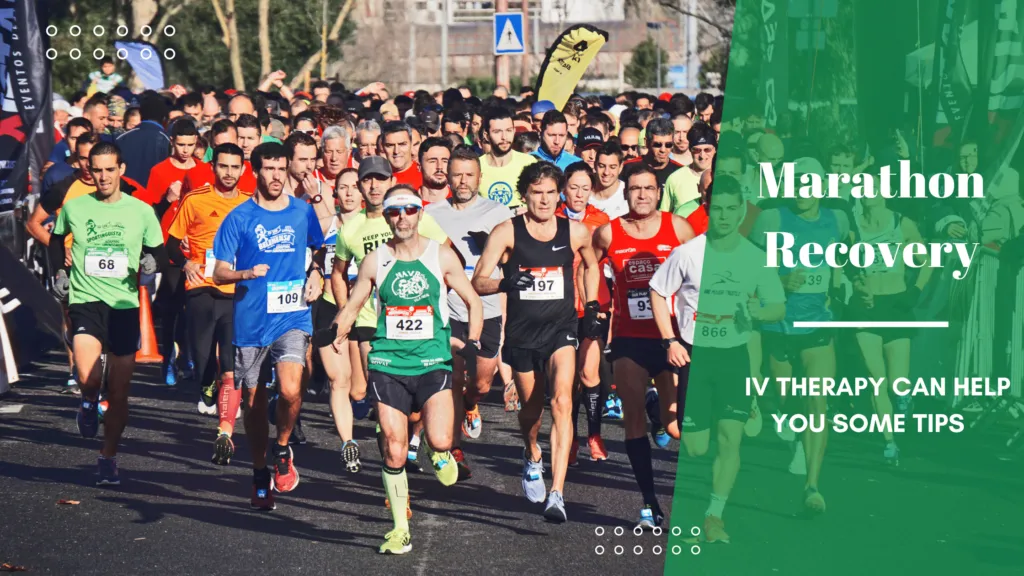Running a marathon, regardless of your finish time, is gruesome enough that you can brag about it to your children, even grandchildren. And the faster you can run 26.2 miles, the more your get to boast about it.
It takes years of preparation and an uncountable amount of miles to prepare your body and mind to run the 26.2 miles. And although preparing for the race is crucial, the way you treat your body after the event is equally important.
How you approach marathon recovery will make all the difference when getting back to training. Particularly if you want to avoid injury and improve your time for the next race.
What Happens to Your Body After Running 26.2 Miles?
During a marathon, your body loses tremendous amounts of liquids, nutrients, and electrolytes. Your muscles and joints take a beating, and even your immune system weakens in the post-race period.
How fast and painless you can recover comes down to how you treat your body after the event and how well-prepared you were before the race.
On average, marathoners lose 2% of their body weight during the race, where most of that is liquid. Naturally, the faster you run, the more you sweat and the more liquid you lose. Through excessive sweating, you also lose extreme amounts of sodium, potassium, and magnesium.
All of which are crucial for muscle recovery. Magnesium especially, as it is one of the components responsible for optimal muscle function and helps deliver oxygen to your muscles.
This brings us to the next point – muscle fatigue. The average marathon finishing times in 2019 in the US were 4 hours and 30 minutes for men and 4 hours and 56 minutes for women. That means your muscles go through almost five hours of non-stop exercise.
After a marathon, there is no avoiding muscle fatigue.
And finally, the loss of all the minerals, electrolytes, and vitamins causes your metabolism to suffer. Hence, some good advice for most marathoners is to avoid people who might have a cold or a different virus in the days after the race, as you will be especially susceptible.
How Can Mobile IV Therapy Help With Marathon Recovery?
Mobile IV therapy helps you boost muscle recovery in two ways. One, you can stay at your location of choice. And two, your body will receive the necessary nutrients through the treatment.
When you order a mobile IV therapy treatment, a registered nurse comes to your home, office, or hotel and administers the therapy after a few basic medical checks. IV therapy lasts 30 to 45 minutes, and the positive effects can linger for the following few days.
The fact you don’t have to wait in the waiting room only to spend the next half an hour in a room together with numerous other patients is reason enough to choose mobile IV therapy as your treatment during recovery.
Helpful Components in Marathon Recovery IV Therapy
You can notice that marathon recovery IV therapy contains two essential vitamins that help your body recuperate faster.
Firstly, there is vitamin B, or more precisely, all eight B vitamins. B vitamins help your body process food into energy and are essential for red blood cell production. Red blood cells deliver oxygen to your muscles and are a part of your immune system’s defense response.
Vitamin C is the second vitamin playing a vital role in muscle recovery. After running such long distances, your muscle tissue tears, and your joints and ligaments go through extensive damage. Collagen is a protein that keeps your joints, muscles, bones, and skin healthy and elastic. And vitamin C is a crucial component in collagen production.
Then you have magnesium, a mineral whose levels drop rapidly during any exercise and even more during three-plus hours of running. During marathon recovery, magnesium prevents cramps and spasms, plus it also plays a role in red blood cell production making sure your muscles get enough oxygen.
Glutathione is another component in marathon recovery IV therapy and a popular supplement choice for many athletes. Glutathione is an antioxidant fighting oxidative stress. Oxidative stress follows after heavy exercise as one of the causes of muscle fatigue. Therefore, glutathione helps reduce muscle fatigue and keeps you healthier in general.
Finally, intravenous therapy preventing muscle fatigue contains lipotropic compounds, chemicals aiding metabolism break down fat. Lipo-C, as the treatment is named, can be helpful to your body to process fat and preserve lean muscle tissue.
Muscle Pain After Running a Marathon? Introduce Toradol
Pain is the final problem you want to treat during marathon recovery with IV therapy. Not only is pain uncomfortable, but unless you are a professional athlete, you probably also have a life to go back to.
You cannot afford to lie on your couch for a week. You have to go to work, maybe you commute by bicycle, or you spend most of your work day on your feet.
Whatever the reason, pain is a nasty occurrence, and you want to get it under control and fast. Toradol is the component in marathon IV therapy that helps you get through the after-race muscle fatigue.
Toradol is an anti-inflammatory pain reliever used in many IV treatments. The foremost advantage of taking Toradol intravenously, as opposed to drinking ibuprofen, is that Toradol acts almost immediately because you receive it directly into your bloodstream.
Theraptiva Can Help You Get Back on Track Faster
You should consider many factors if you want your muscles to recover as fast as possible and without injury. You should get enough sleep, replenish your nutrients through proper food intake, and give your body enough time to recover.
However, IV therapy can play a substantial role in faster recovery because it delivers the nutrients your body needs directly to your bloodstream, avoiding the dietary tract.
If you are located in North or East Texas, or the DFW cities, then Theraptiva is your best choice for faster marathon recovery with IV therapy.

